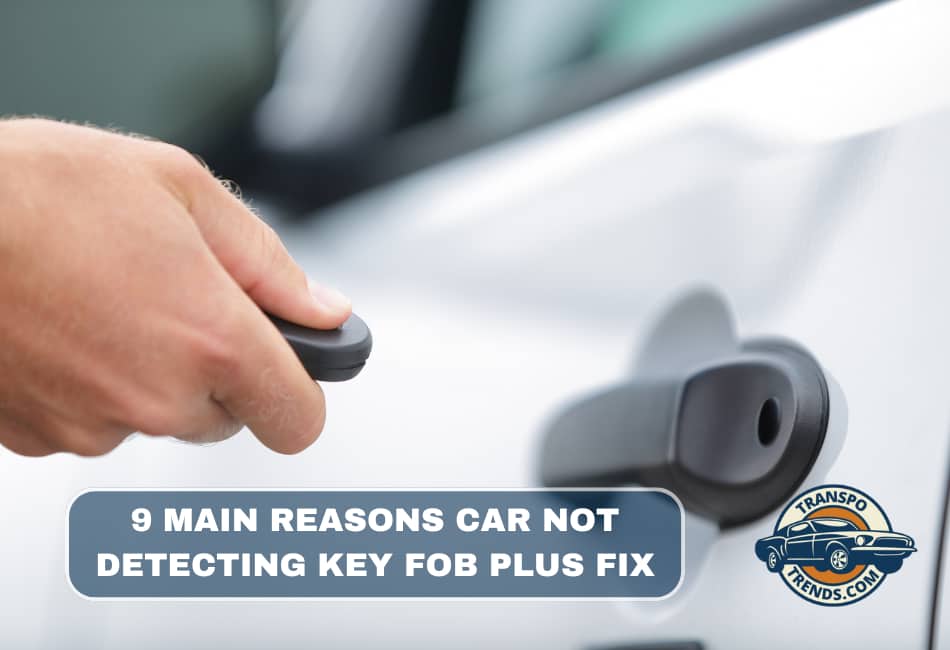A key fob, a critical component in modern vehicles, is a compact security device designed to control and secure access to a vehicle. Its significance goes beyond convenience; it serves as the link between you and your car’s security system.
By transmitting a unique identity code via radio waves, the key fob communicates with your vehicle to unlock doors, illuminate the interior, and even start the engine in some advanced models.
Operating on the principles of radio transmission, the key fob emits a signal that the car’s receiver detects, initiating the requested action if the codes match.
In the realm of vehicle security and convenience, the key fob has become indispensable. Ensuring it functions properly is essential, as any malfunctions can quickly turn into major inconveniences.
In this article, we will explore the key fob’s role in modern vehicles, discuss common issues tied to key fob detection, and provide insights on what to do when your car fails to detect the fob.
Importance of Key Fob Detection
Key fob detection is integral to vehicle security and daily convenience. It is the first line of defense against unauthorized access, ensuring that only the vehicle owner can enter and start the car.
As soon as the key fob’s signal is detected, the doors unlock, and you gain seamless access. Without this functionality, modern vehicles would lose a significant part of their security and ease-of-use benefits.
Security Features Tied to Key Fob Detection
One of the most important aspects of key fob detection is the anti-theft system embedded in modern cars. Many vehicles now include a feature where the engine will only start if the key fob is detected inside the car.
This added layer of security ensures that even if someone manages to enter the vehicle, they cannot drive off without the key fob being present.
Keyless Entry and Ignition
Keyless entry and ignition systems have transformed the way we interact with our vehicles. As long as you have the key fob on you, the car recognizes it and allows you to unlock doors and start the engine without physically inserting a key.
This not only enhances security but also adds a layer of convenience, especially in situations where your hands are full or the weather is less than ideal.
This system has become so intuitive that once you experience it, it becomes difficult to imagine going back to traditional keys.
However, this convenience is reliant on consistent key fob detection, making any malfunction more than just a minor inconvenience.
Common Signs of Key Fob Detection Issues
Key fob detection issues can disrupt your day, leaving you unable to access or start your vehicle. Recognizing the early signs of these problems is crucial to avoiding more significant inconveniences down the line.
Failure of the Keyless Entry System
One of the first signs of a key fob detection issue is when the keyless entry system stops working. You might find yourself standing next to your car, pressing the unlock button with no response.
This can happen even if the key fob is fully functional, pointing to a deeper issue with detection between the car and the fob.
Inability to Start the Car Despite a Functional Key Fob
Another telltale sign is when your car refuses to start, even though the key fob is inside and seems to be functioning correctly.
This can be frustrating and often indicates a problem with the car’s receiver or the key fob’s ability to communicate with the vehicle’s ignition system.
Dashboard Warning Indicators Related to Key Fob Issues
Modern vehicles are equipped with warning indicators that can alert you to potential key fob issues. These can take the form of a blinking key symbol or a specific message displayed on your dashboard.
These warnings should not be ignored, as they are often the car’s way of telling you there is an underlying detection issue that needs attention.
By paying attention to these signs, you can address key fob detection issues before they leave you stranded.
Reasons for Car Not Detecting Key Fob
There are several reasons why your car may fail to detect your key fob, ranging from simple fixes to more complex technical issues. Understanding these causes can help you troubleshoot the problem and determine the best course of action.
1. Dead or Low Batteries
A common and often overlooked reason for key fob detection failure is a dead or low battery. Like any other battery-powered device, your key fob needs sufficient power to send signals to the car.
A gradual decrease in the fob’s range—requiring you to be closer to the car for it to work—can indicate a weakening battery.
Replacing the battery should restore the key fob’s functionality, ensuring it communicates effectively with your vehicle.
2. Faulty Key Fob
A more complex issue could arise if the key fob itself is faulty. Physical damage or manufacturing defects can cause intermittent or complete failure in key fob detection.
Even if the fob appears to be intact, internal damage—especially after being dropped—can disrupt its performance.
If this happens, it’s advisable to have the fob inspected and, if necessary, repaired or replaced by a professional.
3. Interference Issues
External electronic interference can sometimes block or distort the signals between the key fob and the car.
Devices like cell phones, laptops, or other electronics can create interference, leading to detection problems.
Keeping your key fob away from other electronic devices may help prevent such issues. Additionally, environmental factors such as dense urban areas or buildings with strong electromagnetic signals can also contribute to intermittent detection failures.
4. Malfunctioning Receiver in the Car
The receiver in your car is what picks up the signal from the key fob and initiates the unlocking or ignition process.
If the receiver malfunctions, the car may fail to recognize the key fob, even if the fob itself is working properly.
Symptoms of a malfunctioning receiver include the car not responding to the fob even when you’re standing close to the vehicle.
In such cases, a trip to the mechanic or dealership may be necessary to repair or replace the receiver.
5. Programming Issues
Another reason your car may not detect the key fob is related to programming. The key fob needs to be correctly programmed to match your vehicle’s system.
If the fob is not properly paired or becomes deprogrammed, the car will not recognize it. This issue is common when a new key fob is purchased or when the vehicle’s software undergoes an update. In such cases, reprogramming the fob is necessary.
6. Ignition Switch Problems
If the car unlocks, but you cannot start the engine, it could be a sign of a malfunctioning ignition switch.
This problem can prevent the vehicle from detecting the fob’s presence, even though it is inside the car.
A sticky or unresponsive ignition switch may require repair or replacement by a professional to restore full functionality and ensure your car recognizes the key fob correctly.
7. Wiring or Connection Problems
The communication between the key fob and the car’s receiver depends on a network of internal wiring.
If these wires become damaged, loose, or disconnected, the car won’t be able to pick up the key fob’s signal.
This can happen over time due to wear and tear or after minor accidents. Visually inspecting the wiring or having a professional diagnose the issue can help determine whether a wiring problem is causing the detection failure.
8. Vehicle Battery Issues
Sometimes the problem lies with the vehicle’s battery rather than the key fob itself. A weak or dying vehicle battery can affect the electrical systems in the car, including the receiver responsible for detecting the key fob’s signal.
If the battery is too low, the car may struggle to recognize the fob. Checking the vehicle battery and replacing or charging it if necessary can restore normal functionality.
9. Software Glitches
Like many modern devices, vehicles rely on software to function correctly, and key fob detection is no exception.
Occasionally, software glitches or bugs can cause temporary detection issues, preventing the car from recognizing the fob.
Restarting your vehicle or resetting the keyless entry system may resolve these minor glitches. However, if the problem persists, a software update or a visit to the dealership may be necessary.
Troubleshooting and Fixes
If you’re facing key fob detection issues, there are several steps you can take to troubleshoot the problem before seeking professional help:
Check the Key Fob Battery: Ensure the battery is still functional and replace it if necessary.
Inspect for Physical Damage: Check the key fob for any visible damage that could be affecting its functionality.
Check for Interference: Ensure that your key fob isn’t being blocked by other electronic devices or environmental factors.
Test the Car’s Receiver: If the fob is functioning but the car still doesn’t respond, the receiver may need to be inspected by a professional.
Reprogram the Key Fob: If you suspect a programming issue, follow your vehicle’s instructions for reprogramming the fob or seek help from a locksmith or dealership.
By following these steps, you can often resolve common key fob detection problems yourself.
Conclusion
There are several potential reasons why your car may not be detecting your key fob, from something as simple as a dead fob battery to more complex issues like a malfunctioning receiver or software glitch.
Addressing these problems promptly can help you avoid the inconvenience of being locked out or stranded.
Each issue, whether it’s related to programming, wiring, or even interference, has its own solution, and understanding the underlying cause is key to ensuring your vehicle’s key fob system works smoothly.
While many of these issues can be resolved with a bit of troubleshooting, don’t hesitate to consult a professional if the problem persists.
Maintaining your key fob and addressing any detection issues quickly ensures reliable access and a smooth driving experience.

